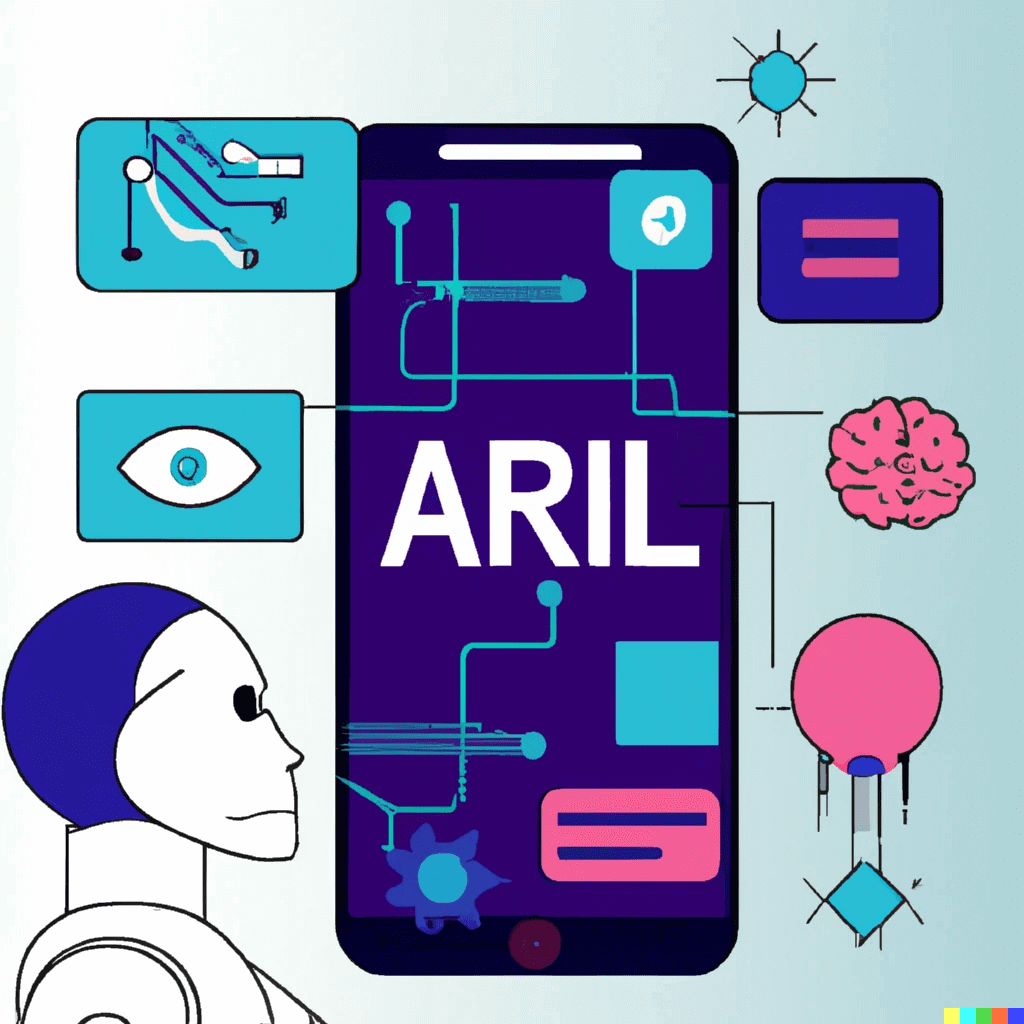Ready for the future? App ideas to create using ChatGPT in 2023
01 Jan 2023 | RightFirms
Related Posts


Oct 2024
Top Mobile App Development Trends to Watch in 2024
Mobile app development is the new hub of innovation in this digital era where businesses are pushing themselves to interact with customers using the maximum extent of technology. With millions of apps on Android as well as iOS, it's necessary for companies and developers to catch up with the ongoing trends. This year is going to emerge as the year of innovative technologies and trends that will change the face of mobile. Here's what you need to look for in the top mobile app development trends that are going to take over the industry this year.1. 5th Technology RevolutionThe dawn of 5G technology is a significant advance in mobile technology, promising faster speeds, lower latency, and more stable connections. Thanks to the full-scale deployment of 5G, developers will produce much more dynamic and immersive mobile apps. In particular, video streaming, cloud gaming, and virtual reality application types will profit significantly from this technology as they offer smoother graphics and real-time, streamless interaction.More importantly, 5G-based Mobile app development services will also offer features that were not possible so far due to the limitation of bandwidth, such as enhanced AR experiences, IoT integration, and smart city functionalities. With the help of 5G, businesses will enhance their user experience and run at a different level of performance altogether. 2. Artificial Intelligence and Machine Learning IntegrationArtificial Intelligence and Machine Learning have found their place in the mobile applications in the recent years and will continue to boom in 2024. AI-facilitated Personalized user experience, real-time predictive analysis- all these AI-treads enable the development of smarter, more tailored solutions for mobile applications.As can be seen, AI chatbots are no longer an exception in mobile app development. Companies are now enjoying the opportunity of interacting and communicating with customers without any proper delays. Health apps are even introducing more accountable diagnostic information using AI. In e-commerce, recommendation products are even placed according to the behavior of users.App development based on AI functionality - recognising faces, real-time language translation, and enhanced security- will grow service demand. Better user retention and engagement will be fruitful to developers embracing AI and ML as they would be able to deliver the most personalized and efficient services for their users.3. Augmented Reality (AR) and Virtual Reality (VR)Not just in the gaming world, AR and VR penetrate into new realms such as e-commerce, healthcare, real estate, and education. Apps which utilize AR/VR share an immersive experience combining the digital world with the real world.Thus, AR and VR will be more in demand in 2024 to develop mobile apps for virtual shopping experiences, interactive learning environments, virtual tours, and even remote medical consultations. Apple's ARKit and Google's ARCore are providing developers the tools to seamlessly implement these new technologies into apps. This pattern sets up tremendous potential for offering richer, more interactive mobile technology. 4. IoT-Enabled Mobile Applications As the Internet of Things is becoming larger, it interconnects more and more devices in order to enable smooth communication among them. From smart homes to smart cities, applications are being enabled by using IoT. The future has a few sectors in mind-medicine, agriculture, automotive, and retail, among others, on which the integration of IoT into 2024 will have the most impact.Developing apps in the IoT ecosystem is complicated, as it needs to ensure safe, scalable, and reliable platforms that would handle tremendous data traffic coming from a large number of connected devices. Mobile technology is the interface between the connected devices and humans; therefore, the developers' focus would be on developing apps that not only control such devices but also probe at this data in real time and provide actionable insights. The demand for app development services based on IoT will rapidly escalate as more and more industries bring their operations online.5. Super AppsEver popular in the world are super applications, wherein the user can do several things within one application. Being first applied and popularized in Asia, super apps like WeChat transformed the face of interaction that the users have towards their mobile technologies. Within one ecosystem, these applications integrate several services like messaging, social networking, e-commerce, and payment processing.Demand for app development services in 2024 will surge as for developing super apps. It will generally be concentrated in Western markets. Convenience is the appeal of using such an app since installing multiple apps and businesses are just starting to see the benefits of comprehensive platforms which retain users on one interface.6. Wearable Technology and AppsMainstreamed with smartwatches, fitness trackers, and even AR glasses, wearable technology is continuing its shape into integrating mobile technology for wearables, with app development specific to those peaking in the year 2024.This trend is also driven more prominently by health and fitness apps, which offer real-time health monitoring and data collection via wearables. Thus, the job for application development services will be merely more sophisticated applications that better sync to wearable devices and present the data accurately in all relevance; at the right time, alerts, even for medial advice.7. Blockchain in Mobile Application DevelopmentWhile blockchain is the technology most often associated with cryptocurrencies, blockchain extends way beyond this application. It helps to ensure that these qualities enhance security, transparency and decentralization-something closer to applications involving sensitive information, such as financial services and healthcare documents, or legal ones.In 2024, more developers will integrate blockchain into their applications to safeguard transactions, reduce fraud, and give their users full control of their information. With this trend, there will also be an increase in the development of decentralized apps or DApps. It is fast becoming popular as it runs on a peer-to-peer network rather than on central servers.8. Cross-Platform App DevelopmentMost of the hype around cross-platform app development tools, such as Flutter and React Native, has been around for some time, but we should witness their reign in 2024 because companies will be trying to come up with a more efficient way of developing apps that work on both iOS and Android. Such frameworks help a developer write an application code only once and deploy it across various platforms, rather than having to develop it separately on different platforms and then struggle with compatibility issues.This trend is highly relevant for startups and small businesses who do not want to spend money in the development of apps separately on each operating system for entering the mobile market. Going forward, with increasing demand for cross-platform development services, developers will focus more on optimizing these frameworks for better performance and user experience.9. Voice Search and Voice Assistants Voice search technology, fueled by AI, is becoming the new input method incorporated into the user experience. More virtual assistants, including Siri, Google Assistant, and Alexa, advance in accuracy; therefore, more users use voice commands while interacting with their mobile devices.2024 would be a year where mobile application development is optimized applications for voice search. This would include voice recognition to navigate free applications with their users. Businesses would be able to make their services more accessible to the customers. Voice assistants would be integrally embedded into applications. These would help the user do tasks in less time and more quickly.10. Cloud IntegrationCloud computing is not something for luxury anymore; it forms an indispensable part of the mobile technology. Cloud-based apps are providing considerable benefits, including decreased loads on the server and increased storage capacity, along with increased safety regarding data. By 2024, more businesses will be looking for app development services that can help include cloud technology into their mobile applications.That implies it is possible to store anywhere in the cloud, and access will be done from any gadget, hence providing a seamless experience across devices. More complex mobile applications make the integration of the cloud of paramount importance in regards to scalability, data backups, and instant collaboration. For developers, it also makes easier the maintenance and updates of these applications.ConclusionThe landscape of mobile app development in 2024 will be about technological innovation and user preferences. AI and 5G will be at the forefront, followed by IoT and blockchain. This platform offers a myriad of tools and trends for developers to bank on. With more and more businesses scrambling into their industry's competitive arena, investing in cutting-edge app development services seems to be the difference between delivering seamless user experiences and keeping them engaged. Companies can position themselves for success by following such trends in this dynamic world of mobile technology.


Jan 2024
Future Trends in Telecom Software for Cloud Contact Centers
For many years, contact center operations have been centered around telecommunications software. These contact centers have changed significantly since the introduction of cloud computing. Still, the landscape is changing quickly. This article explores the future trends that are anticipated to influence telecom software development in cloud contact centers, with an eye on how these developments will transform operational efficiency and customer service. Evolution of Telecom Software in Cloud Contact Centers Revolutionary technological developments have shaped the growth of telecom software in contact centers, changing the face of communication and customer care. In the past, contact centers relied on technology and software that were located on-site, had limited scalability, and were tied to certain locations. However, contact centers experienced a fundamental shift as cloud computing emerged. These centers' operations were completely transformed by cloud-based technologies, which brought accessibility, scalability, and flexibility. Since telecom software served as the glue holding together different aspects of data management and communication, it was essential to this transition. Current Landscape and Challenges Even with these developments, there are still several obstacles facing telecom software in cloud contact centers today: Integration Difficulties: Contact centers continue to have difficulties when integrating various technologies and apps. Modern cloud-based solutions frequently have trouble synchronizing with ancient systems, which results in operational inefficiencies. Security worries: As contact centers handle a growing amount of data, security becomes critical. It's a constant struggle to make sure telecom software has strong security features to safeguard sensitive consumer data from online attacks. Personalized Customer Experiences: It might be difficult to meet the growing demands of customers for tailored interactions. Telecom software must enable consistent and personalized consumer experiences across several channels in a seamless manner. Future Trends in Telecom Software for Cloud Contact Centers 1. Integration of 5G and Its Effects Contact center operations will change once 5G technology is included. 5G will benefit from enhanced video calling and augmented reality compatibility, enabling more immersive customer experiences and real-time interactions with lower latency and quicker speeds. 2. Automation and AI Automation and artificial intelligence (AI) have the potential to completely change how customers engage. Artificial intelligence (AI)-powered chatbots and virtual assistants will respond to queries instantly and uniquely, freeing up human agents to address more complicated inquiries. Routine work will be streamlined by automation, increasing productivity overall. 3. Communication Through Multiple Channels Seamless omnichannel communication is the way of the future. Regardless of the platform selected, telecom software will provide seamless communication over several channels such as chat, email, social media, and voice, guaranteeing a cohesive and uniform customer experience. 4. Analytics and Insights from Data Contact centers will be empowered by using predictive analytics and big data. By analyzing consumer behaviour patterns, telecom software will be able to provide preemptive support and tailored interactions, which will increase customer happiness. 5. Safety and Observance It will be essential for telecom software to have improved security features. Contact centers will concentrate on putting strong authentication, encryption, and compliance procedures in place to protect consumer data by changing legal requirements. 6. Adaptability and Expandability Customization and scalability will be prioritized in telecom software of the future. It will be essential to enable easy scalability and customize solutions to meet individual business needs to support expansion and adjust to shifting demands. Implications and Benefits of Future Trends Future trends in telecom software for cloud contact centers are expected to have a variety of effects and advantages, influencing customer service and operational effectiveness: 1. Improved encounters with customers Upcoming developments in telecom software should lead to previously unheard-of levels of consumer satisfaction. By combining omnichannel communication, AI-driven interactions, 5G technology, and personalized data, contact centers will be able to provide smooth, customized experiences across a range of touchpoints. Stronger client loyalty and satisfaction will result from this improved standard of service. 2. Improved Operational Efficiency Contact center operations will be more efficiently run with the use of cutting-edge telecom software trends. Routine queries will be handled by AI-powered automation, which will lighten the strain on agents and free them up to deal with more complicated problems. By enabling proactive problem-solving and resource allocation, predictive analytics will maximize productivity and resource use. 3. Resource Allocation and Cost Optimization Upcoming developments in telecom software should result in lower costs and more effective resource management. The automation of repetitive processes will result lower operating expenses, and more efficient resource allocation will be made possible by analytics' predictive power. Contact centers will experience increased cost efficiency as a result of this optimization. 4. Industry Competitive Advantage Contact centers can get a competitive edge by adopting the newest telecom software developments. Companies that take advantage of these developments as soon as possible will be in a better position to match changing consumer needs, beat rivals, and stand out from the competition. 5. Information-Based Decision-Making Decision-making procedures based on data would be made possible by advancing telecom software. Contact centers will have access to a multitude of customer insights that will allow them to build and implement well-informed customer relationship management, product development, and service enhancement initiatives. This data-centric strategy will promote ongoing improvements in the calibre of services. 6. Adaptation to Changing Demands Contact centers can be made more resilient to changing market conditions by utilizing cutting-edge telecom software. Over time, scalable solutions will maintain the contact center's agility and relevance by adapting to changes in technology, regulations, and customer needs. 7. Elevated Employee Experience Contact center agents can concentrate on more intricate and meaningful interactions as basic chores are automated by telecom software. A more motivated and engaged workforce will result from this change in job satisfaction, skill development, and professional progress. Challenges and Implementation Considerations Despite how promising these trends may be, obstacles must be overcome for them to be implemented successfully: Mitigating Integration Complexity: To address integration complications and make integrations go more smoothly, it may be necessary to implement phased transitions or specialized middleware. Training and Skill Development: To properly utilize the new telecom software features, contact center employees will need to receive training. Developing skills will be essential if we are to fully utilize the promise of cutting-edge technologies. Infrastructure Compatibility: It will be essential to make sure that the current infrastructure is compatible with the telecom software that is developing. It can be necessary for contact centers to update or change their systems to comply with these improvements. Cloud contact centers seem to have a bright future as long as telecom software keeps improving. Operations will become more customer-focused and efficient if these trends are adopted. The coming together of 5G, AI, omnichannel communication, analytics, security, and scalability will completely change the game and establish new standards for the quality of contact centers.


Dec 2022
How to start a business in 2023 – A Complete Guide
Starting a startup can be a challenging but rewarding journey. It requires a combination of passion, hard work, and strategic planning to turn an idea into a successful business. If you're thinking about starting a startup, here's a detailed guide on how to get started: Identify your strengths and passions. The first step in starting a startup is figuring out what type of business you want to create. To do this, it's important to identify your strengths and passions. Think about what you are good at and what you enjoy doing. This will help ensure that you are motivated and energized by the work you are doing. Look for a problem to solve. A great startup idea often starts with identifying a problem that needs solving. Think about the problems you see in your own life or in the world around you. Is there a product or service that you wish existed? Could you create it? By solving a real problem, you'll be more likely to create a business that has real value to customers. Research your market. Once you have a business idea in mind, it's important to research your market to see if there is demand for your product or service. Look for data on the size of your target market, the competition, and potential customers. This will help you gauge the feasibility of your business idea. Develop a business plan. A business plan is a detailed document that outlines your business goals, strategies, and financial projections. It's an important tool for securing funding and getting your business off the ground. Your business plan should include a market analysis, a competitive analysis, a marketing plan, and a financial plan. Secure funding. Depending on the scale of your startup, you may need to secure funding to get it off the ground. There are a variety of funding options available, including venture capital, angel investors, loans, and crowdfunding. It's important to do your research and choose the option that best fits your needs. Build a team. Starting a business can be a solo endeavor, but it's often more effective to build a team of people who can bring different skills and perspectives to the table. As you build your team, look for people who are passionate about your business and are committed to its success. Launch your business. Once you have a solid business plan, funding, and a team in place, it's time to launch your business. This can involve creating a website, building a customer base, and establishing partnerships. It's important to stay focused and be flexible as you work to get your business off the ground. Adapt and grow. Building a successful startup requires a willingness to adapt and grow as you learn from your experiences. Be open to feedback, test new ideas, and be prepared to pivot if necessary. With a focus on continuous improvement and growth, you'll be well on your way to building a successful startup. Starting a startup is not for the faint of heart. It requires hard work, dedication, and a willingness to take risks. But with the right idea, a solid plan, and a strong team, you can turn your startup dream into a reality. Startup ideas to consider in year 2023 It's difficult to predict with certainty what the best startup ideas will be in 2023, as it will depend on a variety of factors including market trends, customer needs, and technological advancements. In 2023, there may be particular opportunities in areas such as remote work and virtual services, sustainable products and services, health and wellness, education technology, and social media and online marketing. Technology will also continue to play a key role in startup success, with areas such as artificial intelligence, virtual and augmented reality, and cybersecurity all offering potential for growth. However, here are a few potential areas to consider as you brainstorm startup ideas: Remote work and virtual services. The COVID-19 pandemic has accelerated the trend towards remote work, and it's likely that this trend will continue even after the pandemic ends. Consider starting a business that offers virtual services or products that cater to remote workers. Sustainable products and services. As consumers become more environmentally conscious, there may be an increased demand for products and services that prioritize sustainability. Consider starting a business that offers eco-friendly products or services. Health and wellness. The pandemic has highlighted the importance of health and wellness, and it's likely that this trend will continue. Consider starting a business that offers products or services related to health and wellness, such as health food, fitness products, or telemedicine services. Education technology. With the shift to remote learning, there may be an increased demand for education technology and online learning platforms. Consider starting a business that offers digital educational resources or tools. Social media and online marketing. As more businesses shift their marketing efforts online, there may be an increased demand for social media and online marketing services. Consider starting a business that helps other businesses with their online marketing efforts. Remember, these are just a few potential ideas and are not meant to be exhaustive. The key to finding the right startup idea is to stay attuned to market trends and customer needs, and to be open to new opportunities as they arise.







